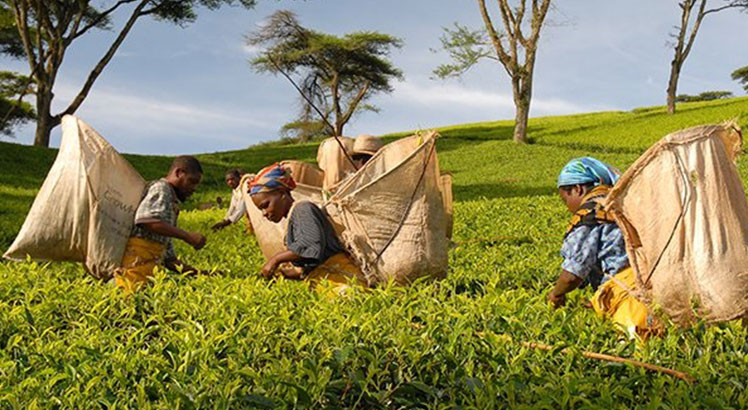Every morning, Stanley Sazuze leaves his village in the tea-growing district of Mulanje and cycles into Mozambique. By the time the sun rises, Sazuze is tending his crops on a four-acre piece of land that he rents.
Sazuze, like many villagers in Mulanje and Thyolo, doesn’t have sufficient land to grow crops to sustain his family.
Mulanje and thyolo plays home to 44 tea plantations owned by 11 international companies
According to the Farmers Union of Malawi, around 84.6 percent of the land is owned by large-scale farmers.
“We are suffering because most of the land here is occupied by tea plantations. This land is very small,” says the maize and pigeon peas farmer.
To feed his family of five, Sazuze also picks tea at one of the 44 plantations owned by 11 international companies in Mulanje and Thyolo.
Agricultire employs about 80 percent of Malawi’s labour force.While some Malawians struggle to own a small strip of land for subsistence farming, the tea, tobacco, sugar, and macadamia estates own hundreds of acres of land, many of which are sitting idle.
The government offers few solutions for low-income families, so some have begun farming illegally, encroaching on the plantations. Some claim the land was “grabbed” from their ancestors.
This led to scores of arrests, ongoing protests and calls for land redistribution.
In 2005, the government initiated the Community-Based Rural Land Development Project, funded by the World Bank, to relocate landless households from Mulanje and Thyolo to neighboring districts.
But the many families returned home as they found the climate too harsh to farm and the area lacked sufficient social infrastructure.
Following this, Parliament in 2016 passed new land laws to formalise land tenure to ensure equitable access to land.
The laws paved the way for the foreign investment and agricultural commercialisation needed to meet the country’s ambitious vision to become a “self-reliant industrialised upper-middle-income country” by 2063.
However, President Lazarus Chakwera quickly moved to amend the new laws, arguing that they were rushed and had brought discontent.
But the latest amendments are populist and could spook investors, say critics.
In March last year, Chakwera’s government introduced reforms to six land laws, including capping access to agricultural land at 1 000 hectares and introduced ceilings on ownership or leasing of urban residential and commercial land.
The new legislation prohibits ‘nonindigenous’ Malawians from owning land and limits them to 50-year leases on customary land.
This gives government sweeping powers to seize land that remains undeveloped within two years of being acquired and withhold renewal of expired leases.
Insiders accuse Chakwera’s administration of trying to win support in the Southern Region, where there are long-standing issues over land shortages, by introducing populist reforms that curtail unrealistic dreams about reclaiming ancestral lands from foreigners.
He explained: “Neither the 2016 land laws nor the 2022 amendments address the land problem in Mulanje and Thyolo,” Vincent Wandale, a land rights activist in the tea-growing districts.
“The government needs to look at the root cause of the problem of landlessness before coming up with a populist law that could worsen the situation if the plantation owners lost tenancy or decided not to reinvest in the estates because they are not satisfied with the law.”
Meanwhile, private sector groups, mostly foreign investors, say reforms, including the 1 000-hectare land ceilings, will make it impossible to develop large-scale farming.
To them, this means fewer jobs for Malawi’s rapidly growing population and no chance of realising the Malawi Vision 2063.
“Malawi hardly produces anything other than agricultural commodities under fragile rain-fed conditions and so we desperately need foreign direct investment to come in to commercialise production, processing, and get the country into light manufacturing,” Steve Morris, team leader of Traction, a UK aid-funded policy programme running in Malawi, told Devex.
“But these reforms send the message ‘Don’t come to Malawi,’ and we are already seeing evidence of potential investors being scared away. It’s going to make it much harder to achieve growth,” Morris explained.
The Ministries of Land and Justice are drawing up regulations to determine how the new laws are implemented.
Private sector groups say they hope it is not too late to strike a deal that gives investors confidence and enables farmers to grow their businesses.
In his legal analysis of the reforms, land expert Chikosa Silungwe, a former attorney general, described aspects of the legislation as “unconstitutional” and “inconsistent.”
He concluded that the reforms were likely to have a negative effect on foreign direct invest and ongoing donor-funded agricultural modernisation projects.
“There are no discernible benefits to the urban poor, the rural poor and the subsistence of small holder farmers from the land legislation of 2022,” he argued.
Silungwe wants the government to further consult on the regulations.
In December 2022, the World Bank wrote that the land amendment legislation “is seen by many producers as introducing additional obstacles to operating a commercial farm, without significantly improving the security of land tenure,” and could hinder the government’s plans to establish the “mega-farms” envisioned in the Malawi 2063 plan.
The reforms are also discriminatory, critics say, since they target “nonindigenous” Malawians by preventing them from owning land.
This plays into xenophobic fears around nonblack Malawians, especially those of Asian descent, experts warn.
Devex spoke to a Malawian business owner of Asian origin whose family has been in Malawi since the 1870s.
“I feel like a second-class citizen now when I see this legislation coming out,” he said.
The new restrictions on land ownership for non-Indigenous Malawians are already affecting their land development business, they said, by making it hard to secure foreign backers.
Furthermore, the impact of the reforms is being felt in the local financial markets, with banks reluctant to take land as collateral as they did in the past, they added.
International tobacco firm Pyxus, which runs 13 farms across Malawi, said it may be forced to abandon plans to diversify into other value chains, including building warehouses and factories, due to the land ceilings and a new requirement for 50 percent of land converted from agriculture to commercial or residential use to be expropriated by the government with compensation. Although some question whether a fair value will be given for the land and fear it will be handed over to government cronies.
“This is another example of badly-drafted, under-consulted laws which add additional layers of complexity to an already complex operating environment,” Ron Ngwira, who heads Pyxus Agriculture in Malawi.
“We’re competing with markets from Zambia to Brazil and it further weakens the case for Malawi,” he added.
Similarly, Robin Saunders of the Macadamia Association of Malawi said that caps on land ownership will make expanding the macadamia export business impossible.
But fears that the land amendments will scare investors might be misplaced, says Loudon Luka, an expert in urban and regional planning at Mzuzu University.
“Structures have been put in place to protect the interests of investors who need land for their operations,” he explained.
The post Land reforms scare investors first appeared on The Nation Online.
 Moni Malawi
Moni Malawi 

